Article 105: Coffee and coffee shops drive the extensive development of linguistics
Coffee and coffee shops are a source of energy and an ideal environment, driving intellectuals to explore the nature of language and develop foundational linguistic theories.
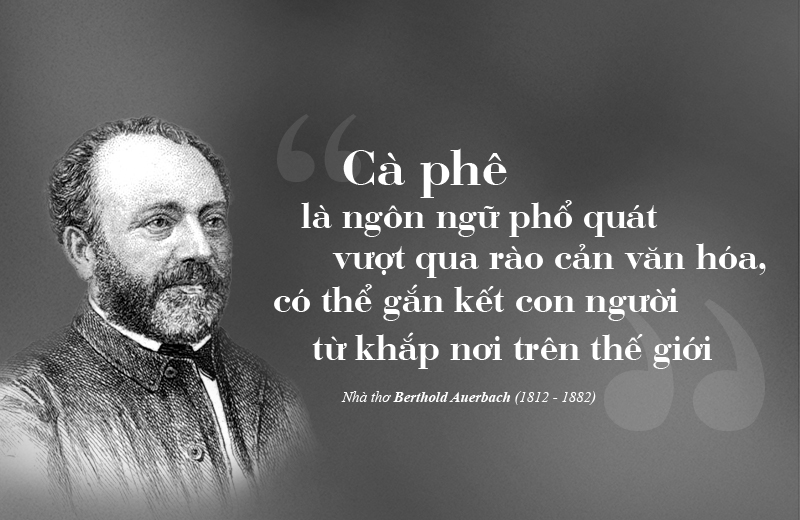
Coffee is a universal language that transcends cultural barriers, capable of connecting people from all over the world. Journalist Berthold Auerbach (1812–1882)
The Influence of Language in Human History
Language has been studied since ancient times across various cultures, including India, China, Greece, and Rome. However, in its early stages, language was considered a part of philosophy. Philosophy explored the nature of language and its impact on human life, forming foundational perspectives that played a crucial role in the emergence of linguistics as an independent discipline in the 20th century.
From antiquity, philosophy recognized the significant role of language in communication and understanding the world. Particularly in societies that revered divine entities, language also served to disseminate doctrines and ideologies, reinforce norms, and clarify religious taboos. During this period, research primarily focused on grammatical aspects of language, such as categorizing parts of speech and establishing principles for word formation and word combinations. The earliest recognized grammatical study is the treatise Aṣṭādhyāyī by the ancient Indian grammarian Pāṇini. This treatise presented a systematic theory defining the morphology and syntax of Sanskrit, while also distinguishing between spoken language and the language used in sacred texts. At the same time, ancient Greek philosophers like Socrates, Plato, and Aristotle discussed the relationship between names and the essence of objects or phenomena, as well as the application of logical principles to explain grammatical features.
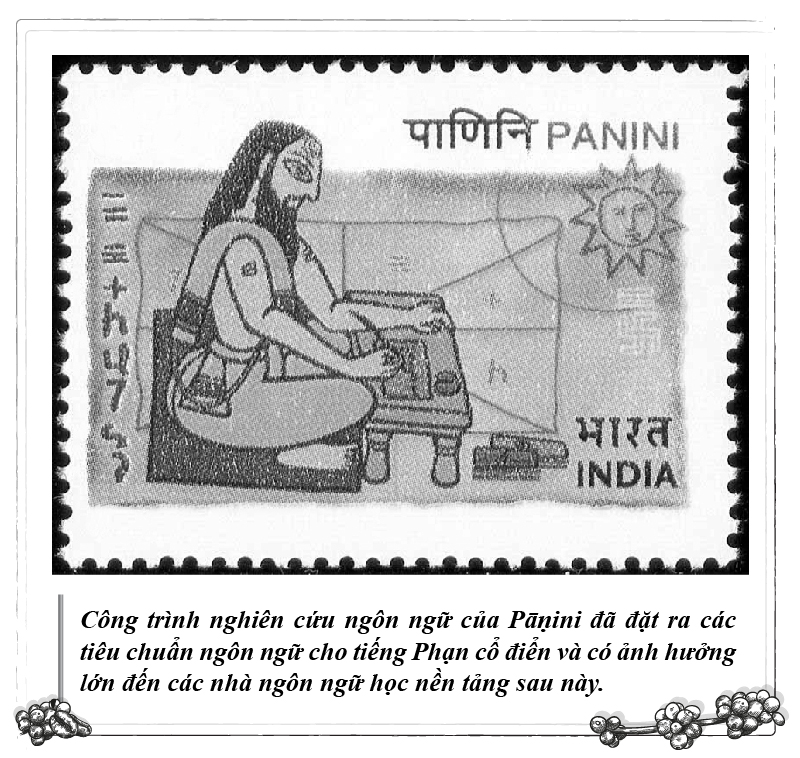
Pāṇini’s linguistic work established the linguistic standards for Classical Sanskrit and had a profound influence on later foundational linguists.
From the Middle Ages, centuries-long events such as imperial conflicts, religious struggles, migrations, and cultural exchanges facilitated the emergence of many new languages. During this period, language increasingly affirmed its role in communication, empire-building, establishing social systems, and asserting social status. Entering the Renaissance, the flourishing of Latin literature, alongside national languages like Hebrew, Arabic, and Italian, as well as the revival of classical studies, spurred the expansion of philosophical language research. Notably, the work “General and Rational Grammar” (Grammaire de Port-Royal), published in 1660 by grammarian Claude Lancelot (1615–1695) and philosopher Antoine Arnauld (1612–1694), made significant contributions. The work compared languages to identify logical grammatical patterns, aiming to construct a universal grammar theory for all languages. This approach marked a new direction in language research. The Grammaire de Port-Royal became one of the most renowned works in the history of linguistics and a foundational text for “modern grammar.”
Language is not a fixed system but is influenced by social changes and other scientific disciplines. During the 19th and 20th centuries—a period marked by significant societal transformations, an emphasis on knowledge, creativity, and the role of individuals—language became central to philosophical debates. Prominent thinkers actively engaged in the study of language, exploring various topics such as the nature of language, the relationship between progressive ideas and the development of language and communication, and the precise role of language in the brain and human cognition.
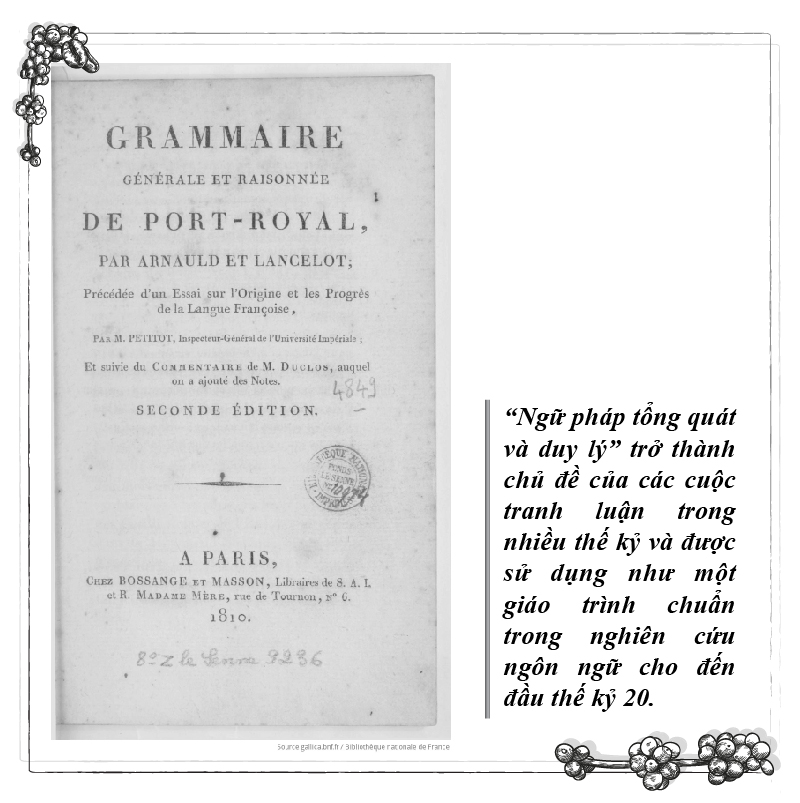
“General and Rational Grammar” became the subject of debates for centuries and was used as a standard textbook in linguistic studies until the early 20th century.
Following a series of studies, at the beginning of the 20th century, linguist Ferdinand de Saussure (1857–1913) published Cours de linguistique générale (Course in General Linguistics) at the University of Geneva. This work had a profound impact on intellectual circles in Europe and North America. From this point, linguistics was officially recognized as an independent scientific discipline, elevating the study of language to the same level as other contemporary social and human sciences. Language also began to integrate with other disciplines, giving rise to new fields such as psycholinguistics, sociolinguistics, anthropological linguistics, and computational linguistics, ushering in a period of extensive development in the study of linguistics.
The Mark of Coffee in the Evolution of Linguistics
Coffee, introduced to Europe in the 17th century, was regarded as a drink that stimulated intellect and fueled philosophers’ pursuit of truth and exploration of the world. Coffeehouses became hubs where like-minded individuals gathered to exchange ideas, engage in academic discourse, and debate, thereby shaping theoretical knowledge systems that significantly contributed to the development of the philosophy of language.
In the 19th century, Viennese coffeehouses played a particularly pivotal role as catalysts for the blossoming and dissemination of new ideas, aligning with the era’s transformative shifts. Psychologist Sigmund Freud (1856–1939) developed his worldview in the famous Café Landtmann and established the Vienna Psychoanalytic Society, hosting weekly discussions at Café Korb. Through these discussions and analyses, Freud recognized the profound relationship between language and psychology. He developed a conceptual model of language, addressing the role of language in consciousness, its connection to thought, the development of language in children, and its function in patient recovery processes.
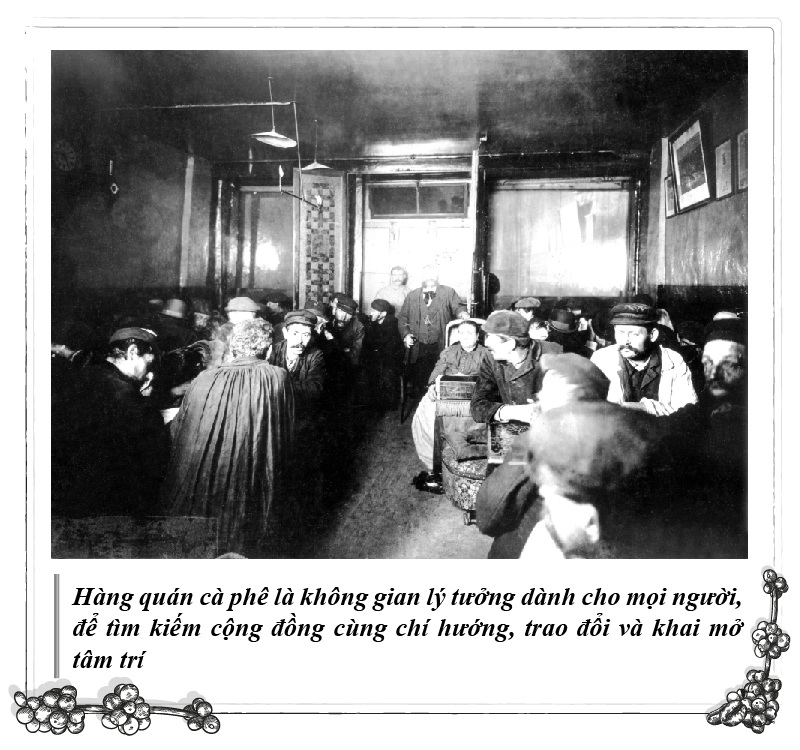
Coffeehouses are ideal spaces for individuals to seek like-minded communities, exchange ideas, and expand their minds.
The 20th century was marked by the emergence of the Vienna Circle, a group of philosophers and scientists striving to reinterpret philosophy in a scientific manner using modern logical tools. The group regularly held discussions in coffeehouses such as Café Reichsrat, Café Central, Café Arkaden, and Café Josephinum. Issues raised during these debates were refined and developed into new philosophical theories. Among them, philosopher Ludwig Wittgenstein (1889–1951) explored concepts about the nature of language and epistemology, particularly the role of language in human thought and life. He introduced the concept of “language games,” considering it the key to understanding how humans convey ideas, both among individuals and across cultures. His philosophical research is regarded as a groundbreaking exploration of the complexities of language, challenging conventional beliefs about communication and meaning, and laying the foundation for transformative shifts in the philosophy of language.
In the 1930s, during the flourishing of logical positivism, one of the members of the Vienna Circle, Austrian philosopher and mathematician Kurt Gödel (1906–1978), conducted groundbreaking research on the logic of language and achieved significant success. Gödel’s incompleteness theorems are among the most iconic scientific achievements of the 20th century. His findings contributed to the development of formal languages and algorithmic computation. Notably, Gödel’s work laid the foundation for programming languages and data structures, establishing the groundwork for computer science and the theory of artificial intelligence. Gödel first presented his incompleteness theorems to the members of the Vienna Circle at Café Reichsrat (Vienna) on August 26, 1930.
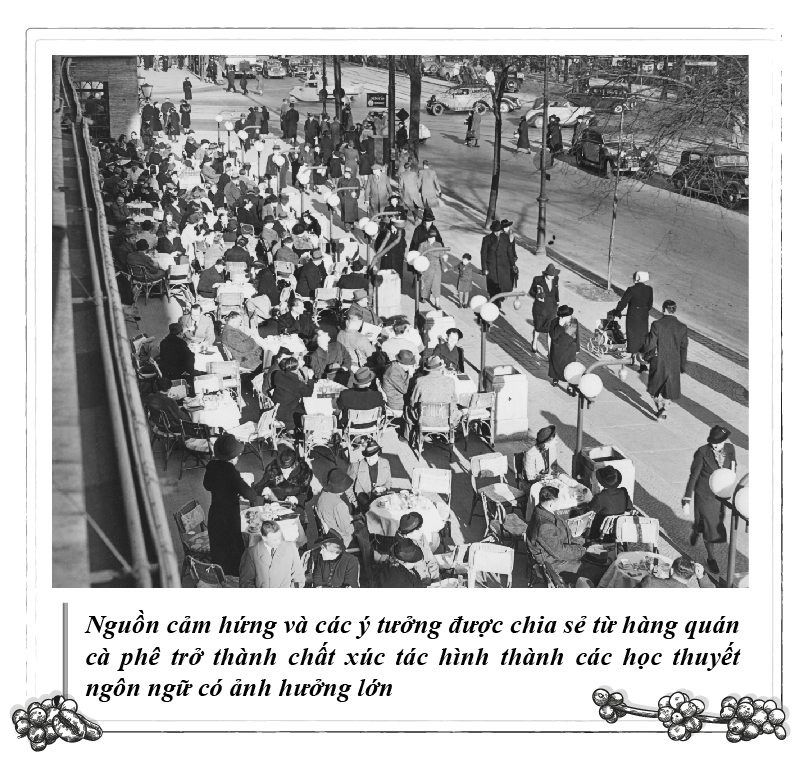
The inspiration and ideas shared in coffeehouses became catalysts for the formation of highly influential linguistic theories.
During this period in Prague, the Prague Linguistic Circle was a society of linguists, philologists, and literary critics founded at Café Derby in Prague. The group developed methods of literary analysis based on structuralism and the historical development of language. The research achievements of the Prague Linguistic Circle made significant contributions to both linguistics and semiotics.
With its ability to inspire and awaken creativity, coffee has always been closely associated with intellectuals across all fields. In particular, coffee was a favorite drink of philosophers such as Arthur Schopenhauer (1788–1860) and Jacques Derrida (1930–2004)—figures of boundless creativity whose research made significant contributions to the comprehensive development of linguistics. Philosopher Arthur Schopenhauer was the first to use logical diagrams to outline the semantics and ontology of concepts. He employed translation theory to clarify the distinction between words and concepts, influencing the translational aspects of linguistics. Meanwhile, philosopher Jacques Derrida studied language through structuralism and introduced a groundbreaking theory that language is chaotic, meaning is unstable, and texts are independent of their authors. His research had a profound impact on fields such as literature, law, applied linguistics, and sociolinguistics.
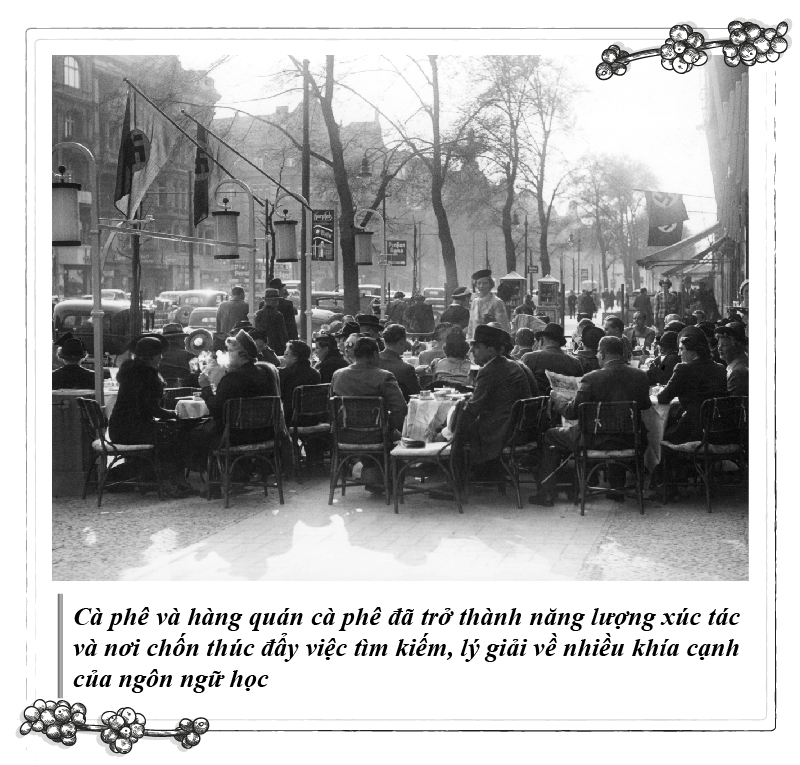
Coffee and coffeehouses have become both a catalytic energy and a space that fosters the exploration and interpretation of various aspects of linguistics.
Coffee and coffeehouses serve as both an ideal source of energy and a social space, inspiring intellectuals to explore and research answers to every aspect of language—ranging from form, semantics, and essence to the relationship between language and other scientific fields. To this day, coffee and coffeehouses continue to play a vital role as bridges for intellectual development, bringing together like-minded individuals to discuss, create, and build diverse works, principles, and theories that contribute to the ever-deepening advancement of linguistics.
Readers are cordially invited to watch the series of The Tao of Coffee videos posted on https://bit.ly/caphetrietdao
THE REAL COFFEE
ROASTED ONLY FOR PEOPLE OF WISDOM!
Coming up: Coffee is the language of life


